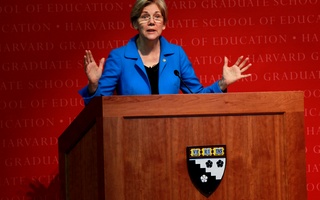The 2016 presidential primary race has thus far been dominated in the media by two candidates situated at the ideological extremes. On the Republican side, Donald Trump has controlled much of the rhetoric and captured the vast majority of the media’s attention; for the Democrats, Vermont Senator Bernie Sanders has established himself as a prominent presence. While Sanders currently has an 11 point lead in the New Hampshire polls, his standing in national polls suggests that he will ultimately not be selected as the nominee. As it did early in the 2008 race, it seems as though Hillary Clinton will inevitably receive her party’s nomination for president.
Despite being a long shot to win the White House, candidates like Sanders have an important role in the election. Though the frontrunner, Clinton is far from progressive—for example, she waited until 2013 to publicly advocate for gay marriage, and did not take a stand against the construction of the Keystone Pipeline until earlier this autumn. In this regard, Sanders serves an important purpose in moving Clinton further to the left ideologically; however, it is unclear that Sanders is the right candidate, given the unworkable nature of some of his policies and the cult of personality that has developed around him.
The reforms that Sanders’ has proposed are unrealistic and prohibitively expensive, with some estimates clocking in at $18 trillion of additional spending over the next decade. For example, his proposal to make public colleges free provides an unnecessary subsidy to students who are able to pay tuition, while neglecting to adequately address the rising costs of private colleges. Flaws like this are indicative of well-meaning policy that sadly comes across as half-baked.
Further, though Sanders is without doubt a deeply charismatic figure, the cult of personality that has developed around him is, in some ways, alarming. While it is good that his rallies, such as the one in Boston last weekend, are drawing large numbers of young adults into politics, they are also indicative of the media’s propensity to focus too heavily on charismatic politics; and in turn, the attempts of politicians to profit off of that focus. The parallel rises of Trump and Sanders are clear evidence of this development—one that benefits the media far more than it does the American people.
Sanders’s popularity also serves as further proof that there should be more Democratic debates throughout the primary process. The two Republican debates have allowed voters more direct access to the party’s candidates, something that is lacking for Democrats. In the interests of fairness, every major Democratic candidate—including Harvard Law School professor L. Larry Lessig—deserves the opportunity to address the voters directly in a debate. We are glad that Sanders has had this opportunity at his large rallies, and think that others should have a platform too. The give and take of ideas during the primary race—whether from Sanders or from other candidates—is vital to our democratic process.
Read more in Opinion
A Hot and Bothered LetterRecommended Articles
-
 Hillary Clinton Shined at Debate, Harvard Professors Say
Hillary Clinton Shined at Debate, Harvard Professors Say -
Sisterhood Gone SourThe notion of girl power shouldn’t be enough to keep every female Democrat worshipping at the altar of Hillary. But past and personal slip-ups that don’t jibe with our current conception of sisterhood shouldn’t be enough to keep us away, either.
-
 Harvard Affiliates React to Iowa Caucus Results
Harvard Affiliates React to Iowa Caucus Results -
Clinton on the TrailClinton seems to be drifting into a familiar panicky pattern that forebodes future setbacks: her fondness for employing family consiglieri to do the dirty work, as if none of the stink will ever make its way back to her.
-
 After Long Wait, Elizabeth Warren Endorses Clinton
After Long Wait, Elizabeth Warren Endorses Clinton













